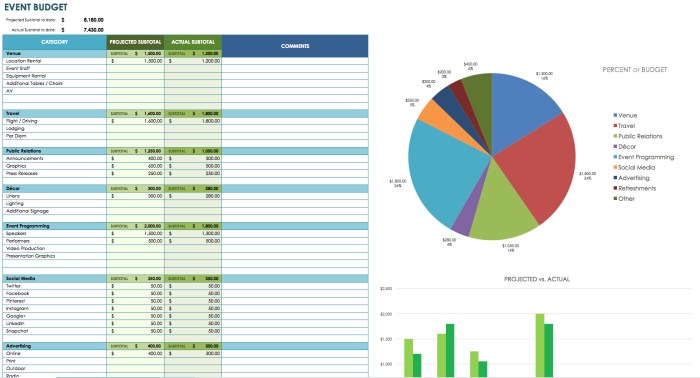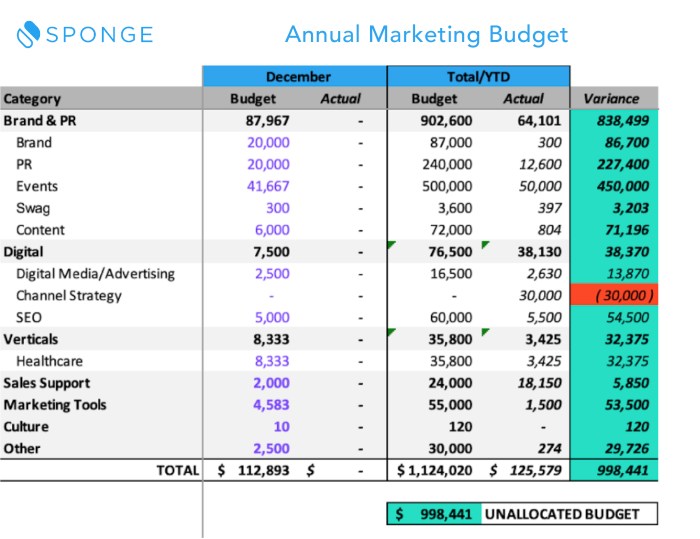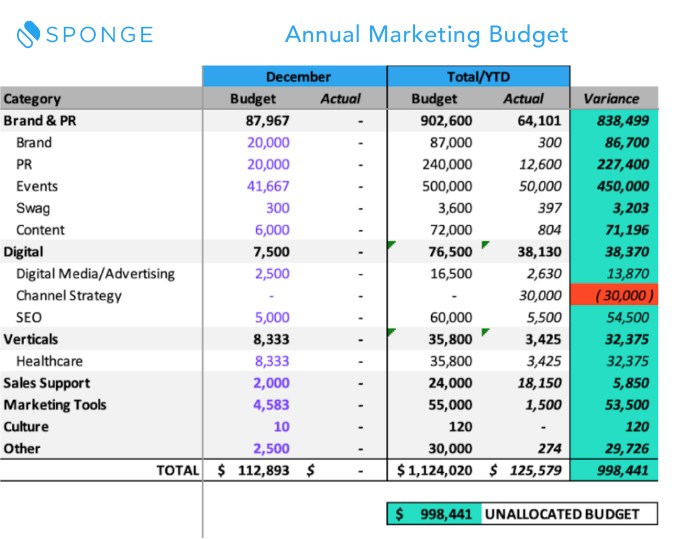Building a Marketing Budget is a crucial aspect of any business strategy. Dive into the world of marketing finance with this comprehensive guide that breaks down the essential steps to creating a successful budget plan.
From understanding the importance of budgeting to allocating funds effectively, this overview will equip you with the knowledge needed to navigate the dynamic landscape of marketing expenditures.
Importance of Building a Marketing Budget
Creating a marketing budget is crucial for businesses to effectively plan and allocate resources for their marketing efforts.
A well-defined marketing budget provides several benefits, such as:
Maximizing ROI
- Helps in setting clear goals and objectives for marketing campaigns.
- Ensures efficient use of financial resources by prioritizing high-impact strategies.
- Allows for tracking and measuring the success of marketing initiatives through established metrics.
- Provides a roadmap for decision-making and adjusting strategies based on performance data.
Contributing to Business Success
- Enables businesses to reach their target audience effectively and generate leads or sales.
- Builds brand awareness and loyalty through consistent messaging and impactful campaigns.
- Helps businesses stay competitive in the market by adapting to changing consumer trends and behaviors.
- Ultimately, a well-planned marketing budget can lead to increased revenue and sustainable growth for the business.
Factors to Consider When Building a Marketing Budget

When creating a marketing budget, there are several key factors that need to be taken into consideration to ensure its effectiveness.
Market research plays a crucial role in determining how budget allocation should be done. By understanding the target audience, market trends, and competitors, companies can make informed decisions on where to invest their marketing dollars.
Past performance data is another important element to consider when planning a marketing budget. Analyzing the success of previous campaigns can provide valuable insights into what strategies have worked well and what areas need improvement.
Key Elements in a Marketing Budget
- Advertising costs
- Public relations expenses
- Digital marketing expenditures
- Sales promotions budget
- Staffing and agency fees
Role of Market Research in Budget Allocation
Market research helps companies understand their target audience better, identify market trends, and analyze competitors’ strategies. This information is crucial in determining where to allocate the marketing budget for maximum impact.
Importance of Past Performance Data
Past performance data provides valuable insights into what strategies have been successful in the past and what areas need improvement. By analyzing this data, companies can make informed decisions on how to allocate their marketing budget effectively.
Setting Goals and Objectives: Building A Marketing Budget
Setting clear marketing goals is crucial when it comes to making decisions about your budget. Without a clear direction to work towards, it becomes challenging to allocate resources effectively. By establishing specific goals, you can prioritize where to allocate your budget and focus your efforts on achieving tangible results.
Importance of Aligning Budget with Specific Marketing Objectives
When your budget aligns with specific marketing objectives, you ensure that every dollar spent contributes directly to achieving those goals. This alignment helps in avoiding wasteful spending on activities that do not directly impact your desired outcomes. By setting clear objectives and aligning your budget accordingly, you can measure the effectiveness of your marketing efforts and make informed decisions to optimize your resources.
Examples of SMART Goals for Budget Planning
- Increasing brand awareness by 20% within the next six months through targeted social media campaigns.
- Generating 500 new leads per month by optimizing strategies and investing in content marketing.
- Improving customer retention rates by 15% by implementing a loyalty program and personalized email campaigns.
Allocating Budget Across Marketing Channels

When it comes to allocating your marketing budget across various channels, it’s essential to consider the effectiveness of each channel and how it aligns with your overall marketing goals.
Comparing Marketing Channels, Building a Marketing Budget
Before deciding how to distribute your budget, it’s crucial to compare the different marketing channels available to you. Some common channels include:
- Social media advertising
- Email marketing
- Content marketing
- and SEM
Strategies for Budget Distribution
One effective strategy for allocating budget across marketing channels is to use a data-driven approach. Analyze past performance data to identify which channels have provided the best ROI and adjust your budget accordingly. Another approach is to allocate budget based on the specific goals of each channel – for example, investing more in social media advertising if your goal is to increase brand awareness.
Tracking ROI for Budget Adjustment
Tracking ROI is crucial for adjusting channel-specific budgets. By monitoring the performance of each channel and comparing it to the investment made, you can optimize your budget allocation for maximum impact. Utilize tools like Google Analytics or marketing automation platforms to track ROI effectively.
Monitoring and Adjusting the Marketing Budget
Monitoring and adjusting the marketing budget is crucial for ensuring that resources are allocated effectively and efficiently. By keeping a close eye on expenses and performance indicators, businesses can make informed decisions to optimize their marketing strategy.
Methods for Monitoring Expenses
- Regularly review financial reports to track spending and identify any discrepancies.
- Utilize budgeting software or tools to streamline the process and maintain accuracy.
- Hold frequent budget meetings to discuss progress and address any budget-related issues.
Significance of Flexibility
Flexibility in adjusting the budget based on performance is essential for adapting to changing market conditions and consumer behaviors. By being open to making changes, businesses can reallocate funds to areas that are yielding the best results and opportunities for growth.
Role of Key Performance Indicators (KPIs)
Key performance indicators (KPIs) play a vital role in budget optimization by providing measurable data on the effectiveness of marketing campaigns. By tracking KPIs such as conversion rates, ROI, and customer acquisition costs, businesses can make data-driven decisions to allocate budget resources strategically.
